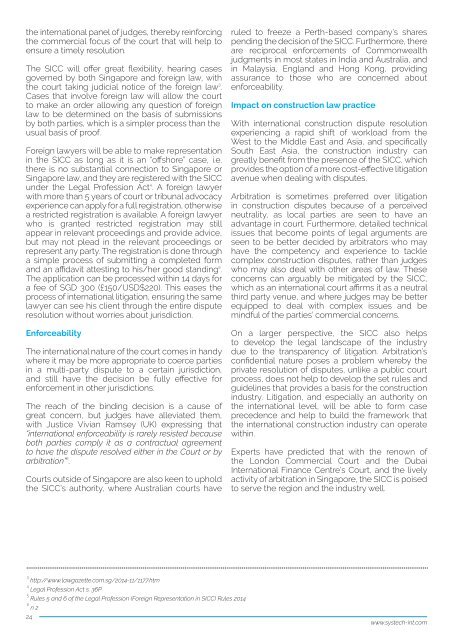SYSTECH SOLICITORS LEGAL UPDATE
4mW0Sv
4mW0Sv
You also want an ePaper? Increase the reach of your titles
YUMPU automatically turns print PDFs into web optimized ePapers that Google loves.
the international panel of judges, thereby reinforcing<br />
the commercial focus of the court that will help to<br />
ensure a timely resolution.<br />
The SICC will offer great flexibility, hearing cases<br />
governed by both Singapore and foreign law, with<br />
the court taking judicial notice of the foreign law 3 .<br />
Cases that involve foreign law will allow the court<br />
to make an order allowing any question of foreign<br />
law to be determined on the basis of submissions<br />
by both parties, which is a simpler process than the<br />
usual basis of proof.<br />
Foreign lawyers will be able to make representation<br />
in the SICC as long as it is an “offshore” case, i.e.<br />
there is no substantial connection to Singapore or<br />
Singapore law, and they are registered with the SICC<br />
under the Legal Profession Act 4 . A foreign lawyer<br />
with more than 5 years of court or tribunal advocacy<br />
experience can apply for a full registration, otherwise<br />
a restricted registration is available. A foreign lawyer<br />
who is granted restricted registration may still<br />
appear in relevant proceedings and provide advice,<br />
but may not plead in the relevant proceedings or<br />
represent any party. The registration is done through<br />
a simple process of submitting a completed form<br />
and an affidavit attesting to his/her good standing 5 .<br />
The application can be processed within 14 days for<br />
a fee of SGD 300 (£150/USD$220). This eases the<br />
process of international litigation, ensuring the same<br />
lawyer can see his client through the entire dispute<br />
resolution without worries about jurisdiction.<br />
Enforceability<br />
The international nature of the court comes in handy<br />
where it may be more appropriate to coerce parties<br />
in a multi-party dispute to a certain jurisdiction,<br />
and still have the decision be fully effective for<br />
enforcement in other jurisdictions.<br />
The reach of the binding decision is a cause of<br />
great concern, but judges have alleviated them,<br />
with Justice Vivian Ramsey (UK) expressing that<br />
“international enforceability is rarely resisted because<br />
both parties comply it as a contractual agreement<br />
to have the dispute resolved either in the Court or by<br />
arbitration” 6 .<br />
Courts outside of Singapore are also keen to uphold<br />
the SICC’s authority, where Australian courts have<br />
ruled to freeze a Perth-based company’s shares<br />
pending the decision of the SICC. Furthermore, there<br />
are reciprocal enforcements of Commonwealth<br />
judgments in most states in India and Australia, and<br />
in Malaysia, England and Hong Kong, providing<br />
assurance to those who are concerned about<br />
enforceability.<br />
Impact on construction law practice<br />
With international construction dispute resolution<br />
experiencing a rapid shift of workload from the<br />
West to the Middle East and Asia, and specifically<br />
South East Asia, the construction industry can<br />
greatly benefit from the presence of the SICC, which<br />
provides the option of a more cost-effective litigation<br />
avenue when dealing with disputes.<br />
Arbitration is sometimes preferred over litigation<br />
in construction disputes because of a perceived<br />
neutrality, as local parties are seen to have an<br />
advantage in court. Furthermore, detailed technical<br />
issues that become points of legal arguments are<br />
seen to be better decided by arbitrators who may<br />
have the competency and experience to tackle<br />
complex construction disputes, rather than judges<br />
who may also deal with other areas of law. These<br />
concerns can arguably be mitigated by the SICC,<br />
which as an international court affirms it as a neutral<br />
third party venue, and where judges may be better<br />
equipped to deal with complex issues and be<br />
mindful of the parties’ commercial concerns.<br />
On a larger perspective, the SICC also helps<br />
to develop the legal landscape of the industry<br />
due to the transparency of litigation. Arbitration’s<br />
confidential nature poses a problem whereby the<br />
private resolution of disputes, unlike a public court<br />
process, does not help to develop the set rules and<br />
guidelines that provides a basis for the construction<br />
industry. Litigation, and especially an authority on<br />
the international level, will be able to form case<br />
precedence and help to build the framework that<br />
the international construction industry can operate<br />
within.<br />
Experts have predicted that with the renown of<br />
the London Commercial Court and the Dubai<br />
International Finance Centre’s Court, and the lively<br />
activity of arbitration in Singapore, the SICC is poised<br />
to serve the region and the industry well.<br />
3<br />
http://www.lawgazette.com.sg/2014-11/1177.htm<br />
4<br />
Legal Profession Act s. 36P<br />
5<br />
Rules 5 and 6 of the Legal Profession (Foreign Representation in SICC) Rules 2014<br />
6<br />
n 2<br />
24<br />
www.systech-int.com


